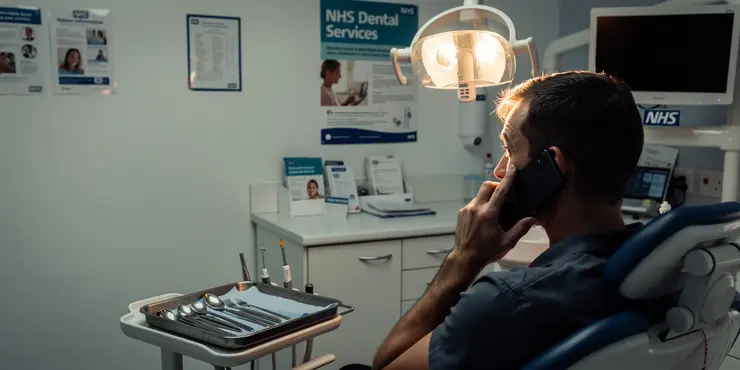
Find Help
More Items From Ergsy search
-
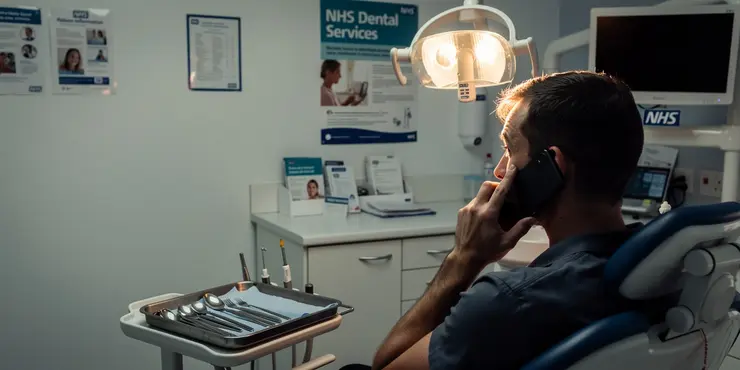
Can I get an emergency NHS dental appointment?
Relevance: 100%
-
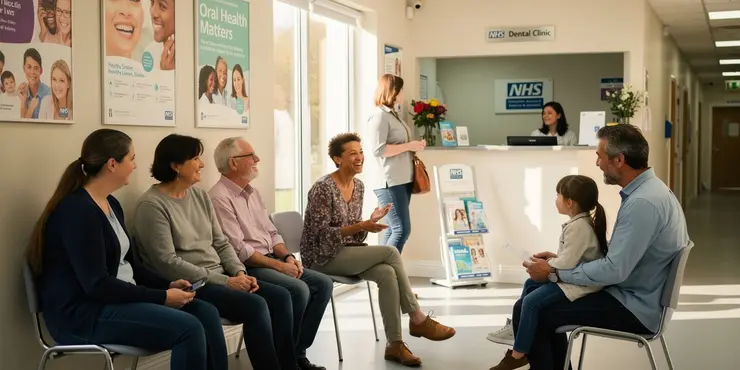
What happens if I miss my NHS dental appointment?
Relevance: 73%
-
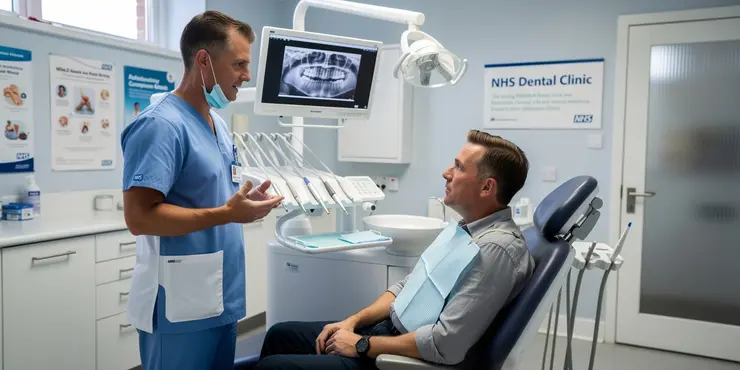
Are all dental appointments free on the NHS?
Relevance: 72%
-
Do I need to be a registered patient to get emergency NHS dental care?
Relevance: 71%
-
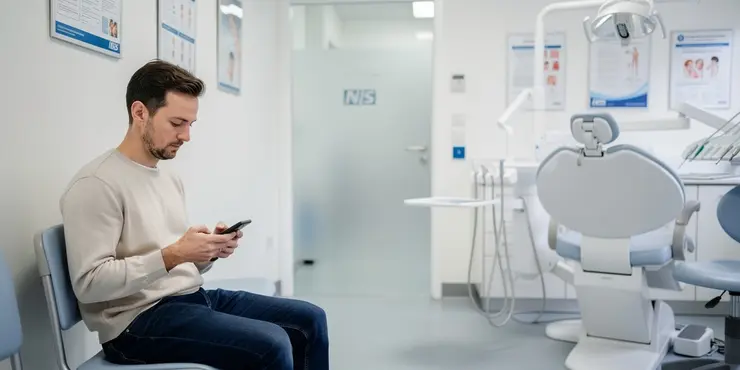
How long will I have to wait for an NHS dental appointment?
Relevance: 70%
-
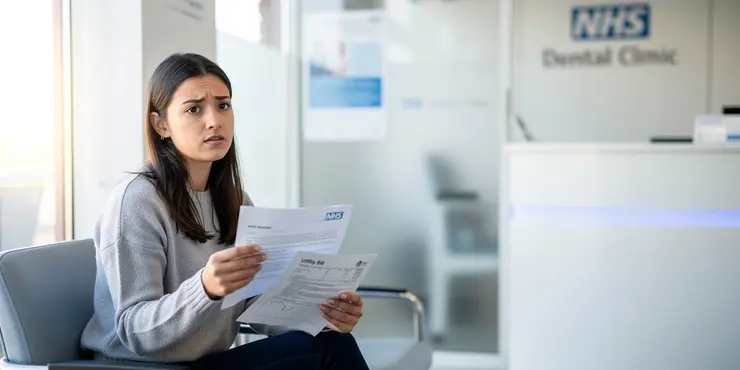
What should I bring to my NHS dental appointment?
Relevance: 69%
-
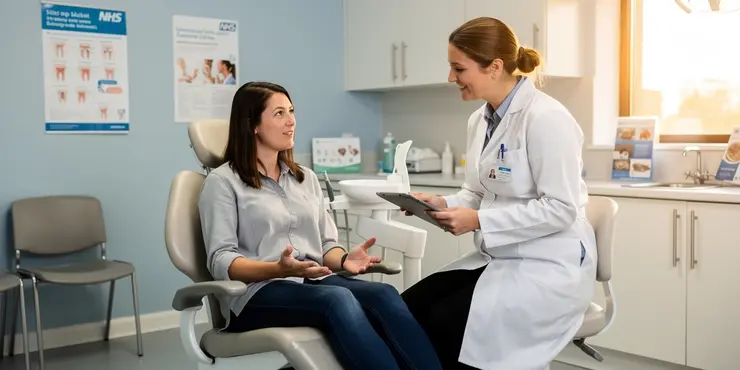
Can I get a dentist appointment on the NHS?
Relevance: 56%
-
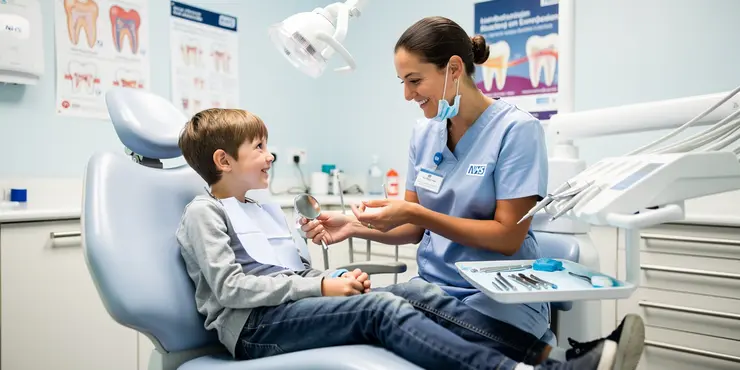
Can children get NHS dentist appointments?
Relevance: 55%
-
What if I need urgent dental care?
Relevance: 55%
-
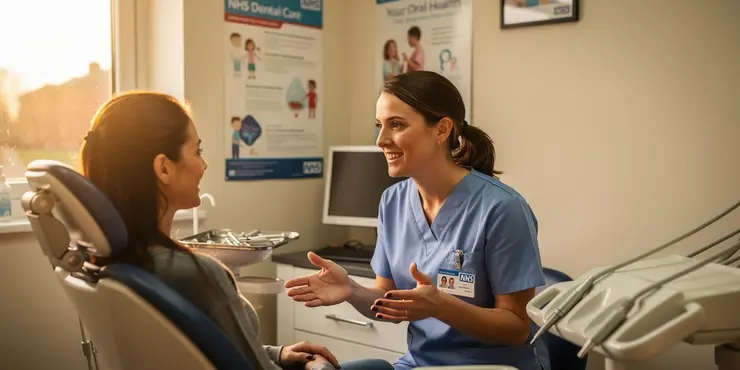
How can I find an NHS dentist for an appointment?
Relevance: 53%
-
What treatments are covered by the NHS dental services?
Relevance: 53%
-
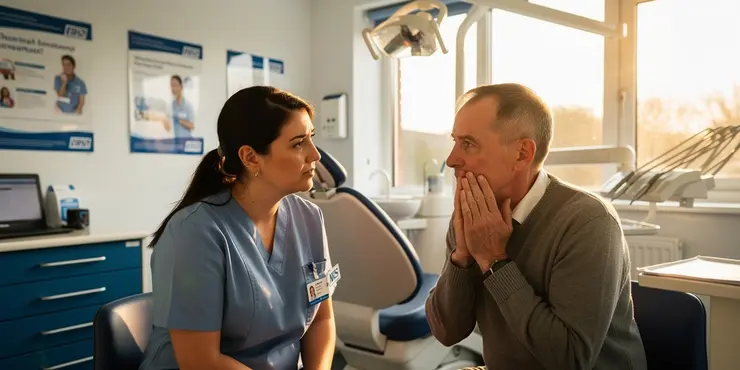
NHS 24 | How to get help for dental pain
Relevance: 53%
-
Can children get free NHS dental care?
Relevance: 50%
-
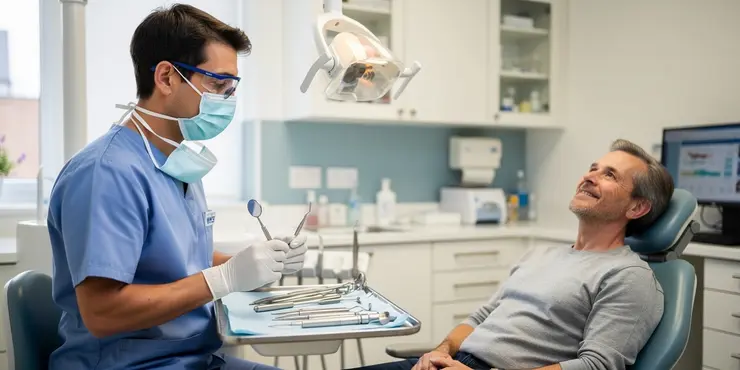
Are there any extra charges for NHS dental treatments?
Relevance: 50%
-
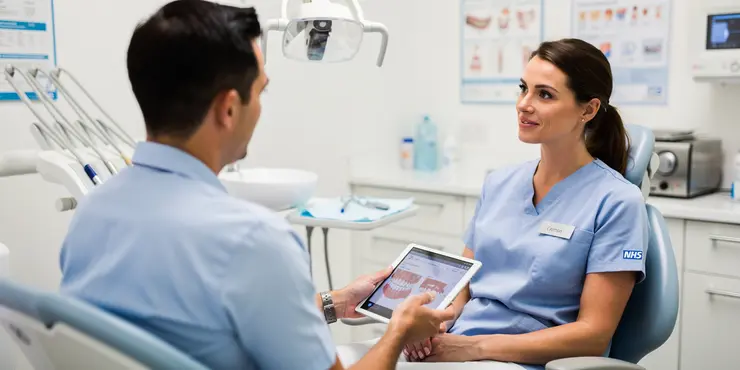
NHS Dental Charges Explained
Relevance: 48%
-
Are there waiting lists for NHS dental treatment?
Relevance: 48%
-
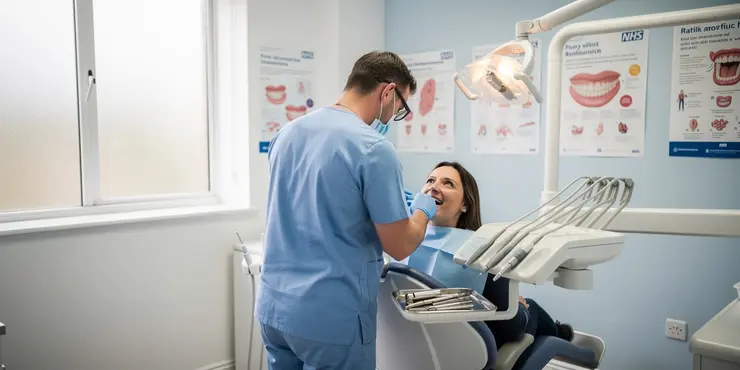
What treatments are covered by the NHS dental service?
Relevance: 48%
-
What languages do NHS dental clinics typically support?
Relevance: 46%
-
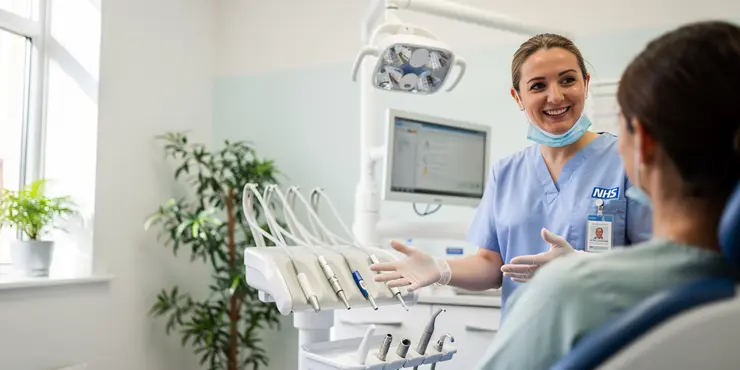
How often should I have a dental check-up on the NHS?
Relevance: 45%
-
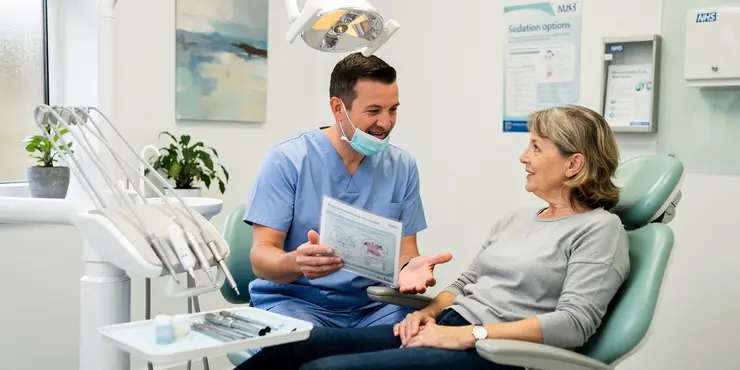
Is sedation available during NHS dental treatments?
Relevance: 44%
-
Are NHS dental charges different across the UK?
Relevance: 42%
-
Can I use private dental services if I'm on the NHS list?
Relevance: 41%
-
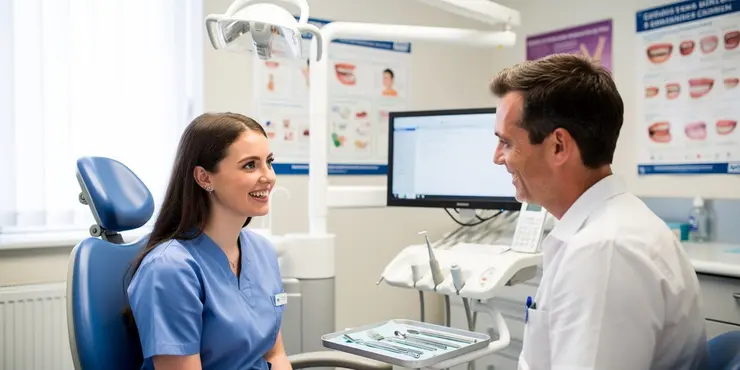
How do I know if I'm eligible for free NHS dental care?
Relevance: 40%
-
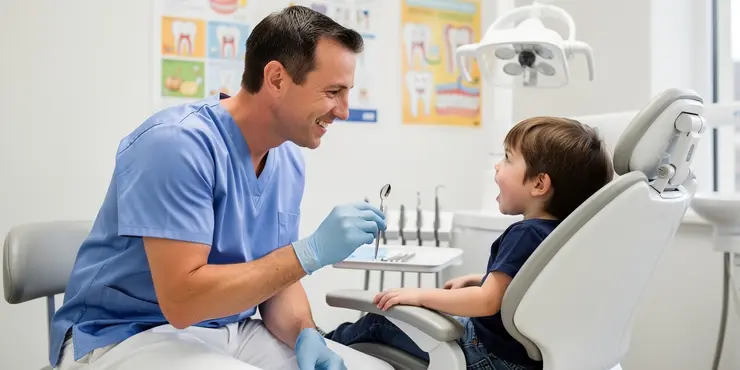
Dental Health: Tips for All Ages
Relevance: 40%
-
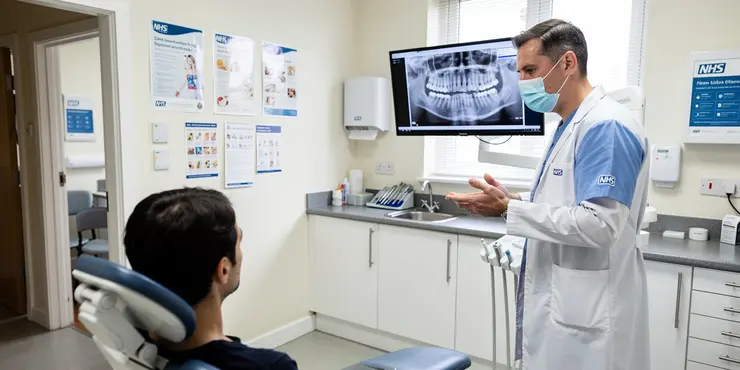
Will Brexit affect my access to NHS dental treatments?
Relevance: 39%
-
Is it safe to get dental work done in Turkey?
Relevance: 39%
-
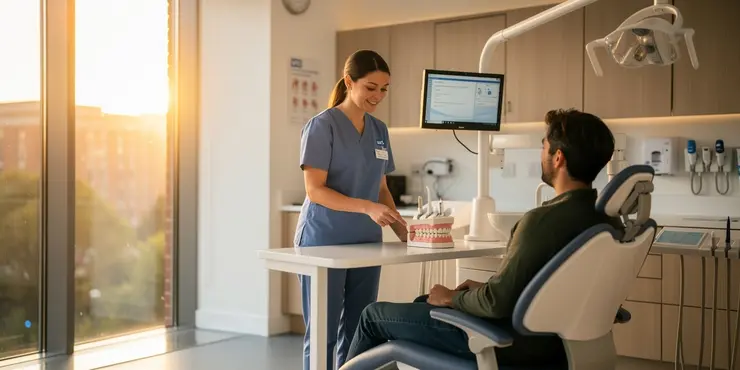
Can I get dental implants on the NHS?
Relevance: 38%
-
What if I'm not satisfied with my NHS dental treatment?
Relevance: 38%
-
How much will I have to pay for NHS dental treatment?
Relevance: 37%
-
Can I get cosmetic dental treatment on the NHS?
Relevance: 37%
-
How do I choose the right dental clinic in Turkey?
Relevance: 37%
-
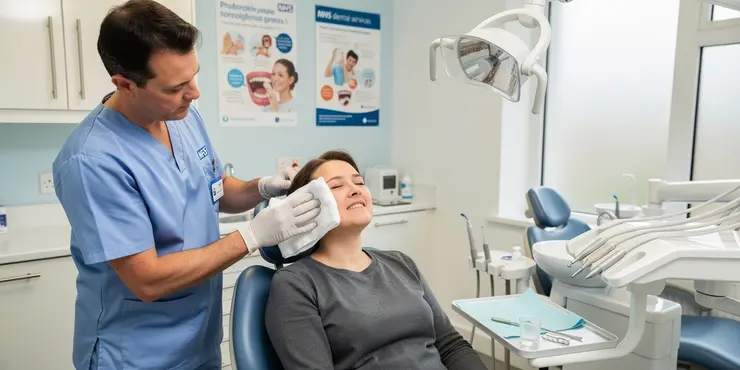
NHS 24 | Self-help tips for dental pain
Relevance: 37%
-
Do I need a referral to see an NHS dentist?
Relevance: 36%
-
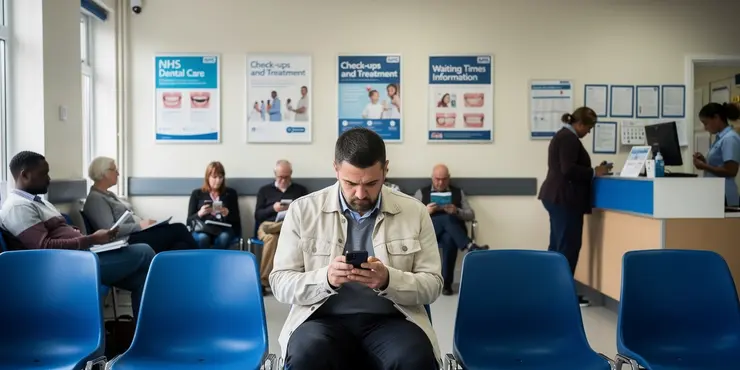
What should I do if I can't get an NHS dentist appointment?
Relevance: 36%
-
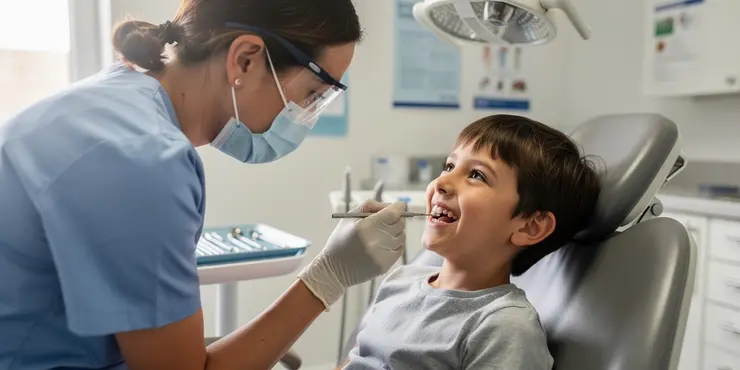
What is the role of dental sealants in preventing tooth decay?
Relevance: 36%
-
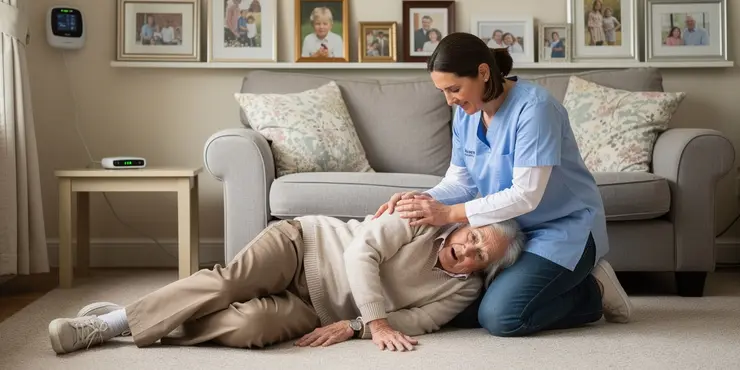
How do live-in caregivers handle emergencies?
Relevance: 35%
-
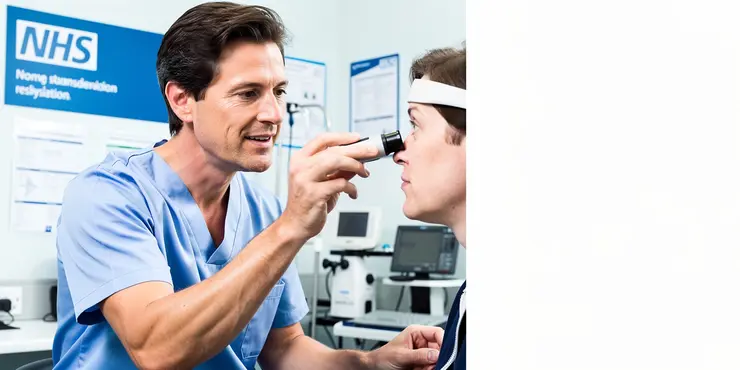
Is hypotony a medical emergency?
Relevance: 35%
-
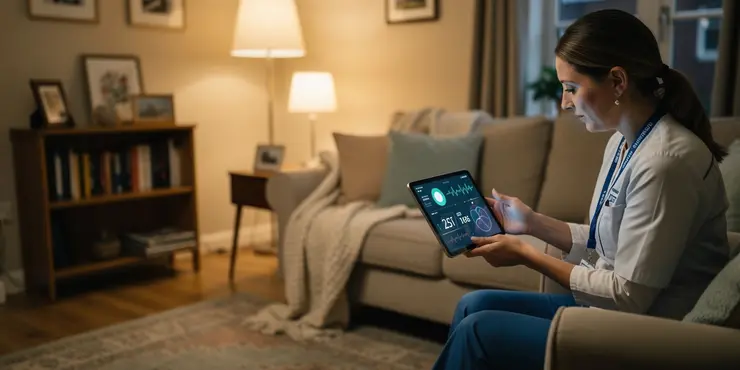
How are emergencies handled in a virtual ward?
Relevance: 35%
-
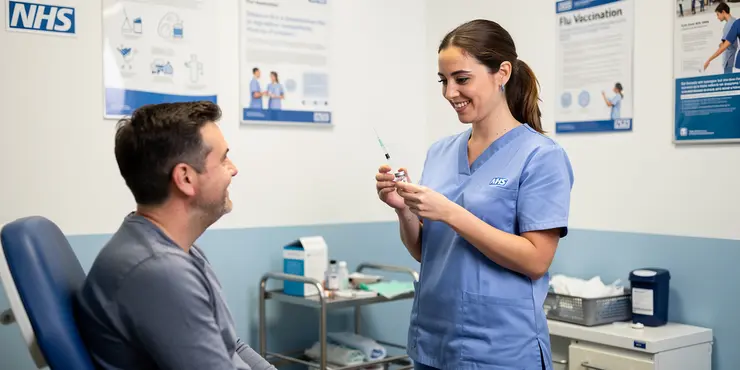
How do I book an appointment for the flu vaccine?
Relevance: 34%
-
How can I provide feedback about my NHS dental care?
Relevance: 34%
Understanding Emergency NHS Dental Appointments
In the United Kingdom, dental emergencies can arise unexpectedly, causing discomfort and concern. It is crucial to know how to access emergency NHS dental care when you are in urgent need of dental assistance. The NHS provides dental services to handle a wide range of emergency situations, ensuring you receive necessary care as promptly as possible.
What Constitutes a Dental Emergency?
Recognizing what qualifies as a dental emergency is the first step in determining whether you need an emergency NHS dental appointment. Common examples of dental emergencies include severe toothache, dental abscesses, a knocked-out or broken tooth, and significant bleeding following a dental procedure. If you are experiencing extreme pain, swelling, or any situation that involves damage to the mouth, jaw, or teeth that needs immediate attention, you should seek emergency dental care.
How to Get an Emergency NHS Dental Appointment
If you require an emergency NHS dental appointment, the process involves a few essential steps. Firstly, during regular office hours, contact your dental practice and explain your situation. Many dental practices set aside time for emergency cases and will try to see you as quickly as possible.
If you do not have a regular dentist, you can use the NHS urgent dental care service. During working hours, call NHS 111 for assistance in finding a local dental practice that can offer emergency treatment. NHS 111 is a free-to-use service available 24/7, where trained advisers will direct you to the appropriate local services.
What to Expect at an Emergency Dental Appointment
During an emergency NHS dental appointment, the dentist will assess your condition to provide the necessary treatment. The primary goal is to alleviate pain and address any immediate concerns. Depending on the severity of the issue, further appointments may be scheduled. Fees for emergency treatment vary, and it is advisable to check the latest NHS dental charges.
Preventing Dental Emergencies
While not all dental emergencies are avoidable, maintaining good oral hygiene can significantly reduce the risk of sudden dental issues. Routine check-ups and dental cleanings can help identify and treat potential problems before they become emergencies. Additionally, using a mouthguard during sports activities and avoiding chewing hard objects can protect your teeth from trauma.
Conclusion
In cases where dental emergencies occur, understanding how to access NHS services is vital. Knowing what steps to take, who to contact, and what to expect can relieve some stress in an emergency situation. Regular dental care and preventive measures can also play a significant role in minimizing the risk of emergencies. When in doubt, never hesitate to reach out to NHS services for guidance and care.
Understanding Emergency NHS Dental Appointments
In the UK, sometimes teeth problems can happen suddenly. It can hurt a lot and make you worry. It's important to know how to get help from the NHS when you have a tooth emergency. The NHS can help with many different teeth problems quickly.
What is a Dental Emergency?
Knowing what a dental emergency is can help you decide if you need help fast. Here are some common emergencies: a really bad toothache, an abscess (which is a painful swelling), a tooth that is knocked out or broken, or a lot of bleeding after seeing a dentist. If you have a lot of pain, swelling, or any mouth, jaw, or tooth damage that needs urgent help, you should see an emergency dentist.
How to Get an Emergency NHS Dental Appointment
If you need to see a dentist urgently, here are some steps. First, call your dentist during their office hours and tell them your problem. Many dentists can see you quickly if you have an emergency.
If you don't have a dentist, you can use the NHS urgent dental care service. During the day, call NHS 111. They can help you find a dentist nearby who can help you with emergencies. NHS 111 is a free service you can call anytime, day or night. The people there will help guide you to the right place.
What to Expect at an Emergency Dental Appointment
When you go to an emergency NHS dental appointment, the dentist will check your problem and try to help you feel better. Their main job is to stop the pain and fix any urgent problems. Sometimes you might need to come back for more visits. The cost of the treatment can change, so it's good to check the latest NHS dental prices.
Preventing Dental Emergencies
Not all emergencies can be stopped, but taking care of your teeth can help a lot. Regular dentist visits can find problems early. Brushing and flossing your teeth are important. Also, use a mouthguard if you play sports and try not to chew on hard things to keep your teeth safe.
Conclusion
If you have a dental emergency, knowing how to use NHS services can help a lot. Knowing what to do, who to call, and what will happen can make things less stressful. Regular dental care and being careful can help stop emergencies before they happen. If you're not sure, don't wait to contact NHS for help and care.
Frequently Asked Questions
What qualifies as a dental emergency for the NHS?
Severe pain, bleeding, or infection that requires immediate attention typically qualifies as a dental emergency.
How can I get an emergency NHS dental appointment?
You can contact NHS 111 for guidance on accessing emergency dental care.
Are emergency dental services covered by the NHS?
Yes, emergency dental services are covered, but there may be a standard NHS charge unless you’re exempt.
What should I do if I need an emergency dentist outside of regular hours?
Call NHS 111 to find an out-of-hours emergency dental service.
Will I need to pay for emergency dental treatment on the NHS?
You may need to pay a Band 1 NHS charge unless you're eligible for free treatment.
Can I go to A&E for a dental emergency?
A&E should only be used for dental emergencies if they're life-threatening or if you're advised to go there by NHS 111.
How long will I have to wait for an emergency NHS dental appointment?
Wait times can vary, but NHS 111 will help prioritize cases based on urgency.
What information should I provide when seeking an emergency dental appointment?
Provide details of your symptoms, any medications you're taking, and any recent dental work.
Are there any conditions that do not qualify for an NHS emergency dental appointment?
Routine dental issues like small cavities or non-urgent check-ups typically do not qualify.
What if I can't contact my regular dentist for an emergency?
If your dentist is unavailable, call NHS 111 for advice on finding emergency care.
Can I get an NHS emergency dental appointment if I'm not registered with a dentist?
Yes, you can still access emergency dental services via NHS 111 even if you're not registered.
Is there a difference between NHS and private emergency dental appointments?
Yes, private dental services may offer quicker or more flexible options, but they will come at a cost.
What should I bring to an emergency dental appointment?
Bring any identification, details of any medication you're taking, and payment method for any charges.
What if I have an emergency dental issue while traveling in the UK?
You can access emergency dental care anywhere in the UK through NHS 111.
Can children get emergency NHS dental appointments?
Yes, children can receive emergency dental care through the NHS.
How do I know if I need emergency dental care?
Severe pain, swelling, trauma, or dental abscess may require emergency care.
What happens during an NHS emergency dental appointment?
The dentist will assess your condition and provide necessary treatment or advice.
Can my emergency dental treatment be completed in one visit?
It depends on the severity of your issue; follow-up may be needed.
What should I do if my emergency dental issue isn't resolved?
If the issue persists, seek further advice from your dentist or NHS 111.
Can I get a prescription for pain from an emergency dental appointment?
Yes, a dentist can prescribe medication to help manage pain or infection.
What is a dental emergency for the NHS?
A dental emergency is when you need a dentist right away. It is something that cannot wait. Here are some examples:
- If you have a bad toothache that will not go away
- If your mouth or face is swollen
- If you are bleeding and it does not stop
- If you have had a big accident and hurt your teeth or mouth
If you think you have a dental emergency, you should call a dentist or the NHS for help. They can tell you what to do. Having a phone number ready can make it easier to get help fast.
If you have very bad pain, bleeding, or an infection, you need to see a dentist right away. This is called a dental emergency.
How can I get an emergency NHS dental appointment?
If you need to see a dentist quickly, here is what you can do:
- Call your regular dentist. Tell them it is an emergency.
- If you do not have a dentist, call the NHS helpline at 111.
- Tell them you need to see a dentist quickly. They will help you.
Some tips to help:
- Ask someone to help you call if you find it hard.
- Make a note of any pain or problems you have. This will help the dentist.
You can call NHS 111 for help if you need a dentist in a hurry.
Does the NHS pay for emergency dentist visits?
Can the NHS help pay if you have a tooth emergency? This means a sudden tooth problem that needs fixing fast. Think of calling your dentist to ask more questions. A family member or friend can help too. You can also use text-to-speech apps to listen to this information.
Yes, you can get help for a dental emergency. You might have to pay the usual NHS fee unless you do not need to because of special reasons.
What to Do if You Need a Dentist in an Emergency When the Office is Closed
Sometimes your tooth might hurt or you have a dental problem when the dentist's office is closed. Here are some easy steps you can follow:
- First, stay calm and ask an adult to help you.
- Look online for your dentist's phone number or check a card you got from them.
- Some dentists have a special number you can call in an emergency. Call this number if you have it.
- If you cannot reach your dentist, you can search online for an emergency dentist near you.
- If you’re in a lot of pain or have a serious problem, ask an adult to take you to the hospital.
Remember, it's okay to ask for help. You will feel better soon!
Call NHS 111 to find a dentist for emergencies at night or weekends.
Do I have to pay for emergency dentist help from the NHS?
You might need to pay a Band 1 NHS charge unless you can get free treatment.
Can I visit A&E for a tooth problem?
If you have a tooth problem, ask: Should I go to A&E?
- If your mouth is bleeding a lot and won't stop, you can go to A&E.
- If you are in a lot of pain, it's a good idea to call a dentist first.
- If you are not sure, you can call 111 for advice.
Here are some things you can do:
- Ask an adult to help you make a phone call.
- Keep a list of important phone numbers handy.
Go to A&E only if your tooth problem is very bad and could be dangerous to your life, or if NHS 111 tells you to go.
How long will I wait for an emergency NHS dentist visit?
Getting help from an NHS dentist in an emergency can take some time. Here are some tips to help you:
- Call your dentist and tell them it's an emergency.
- They will tell you what to do next.
- If it's very urgent, they might see you the same day.
If you don't have a dentist, you can:
- Use the NHS website to find one nearby.
- Call NHS 111 for advice and help.
Remember, emergency treatment is for problems that can’t wait. If you’re in pain or have another problem, getting help is important. You can also ask someone you trust to help you make the call or understand what to do next.
Sometimes you might have to wait, but NHS 111 will decide who needs help first based on how serious the problem is.
What should I tell when I need a dentist fast?
Tell what hurts in your mouth.
Say where the pain is.
Share any allergies you have.
Tell about medicines you take.
Say if you had dental problems before.
To help, you can:
- Write down what you need to say.
- Ask someone to help you talk to the dentist.
Tell the doctor how you feel. Say if you take any medicine. Tell them if you went to the dentist lately.
When can't you get an emergency dentist appointment from the NHS?
Simple tooth problems like tiny holes in teeth or regular dentist visits usually do not count.
What should I do if I can't reach my usual dentist in an emergency?
If you have a dental problem and can't call your usual dentist, don't worry. Here's what you can do:
- Look for a different dentist near you. Search online or ask someone you know to recommend one.
- If it hurts a lot, you can go to an emergency dentist. You can also ask a grown-up to help you find one.
- Use a phone to call different dental offices. Ask if they can see you quickly.
It's good to have someone with you to help. They can make calls or keep you calm.
If your dentist can't help you, call NHS 111. They can tell you how to get emergency help.
Can I see an NHS dentist for an emergency if I don't have a dentist?
Yes, you can get emergency dental help with NHS 111, even if you're not signed up with a dentist.
Are NHS and private emergency dentist visits different?
Yes, NHS and private dentist visits can be different. Here’s how:
Cost: NHS dentist visits usually cost less. Private visits can be more expensive.
Waiting Time: NHS visits might have a longer wait. Private visits can be quicker.
Choice: Private visits might let you choose your dentist. NHS visits might not.
If you need help, ask someone you trust. You can also use tools like audiobooks or read-aloud software.
Yes, private dentists might be faster or more flexible, but you will have to pay more.
What do I need to take to an emergency dentist visit?
Bring some ID, a list of any medicine you take, and money or a card to pay for anything.
What should I do if my tooth hurts while I am in the UK?
If your tooth starts to hurt and you are in the UK, do not worry. Here are some simple steps you can follow:
- Stay calm. Take deep breaths.
- Look for a nearby dentist. You can ask someone for help or use your phone to find one online.
- If you cannot find a dentist right away, go to a hospital. They can help with emergencies.
It might help to have these things ready:
- Your phone charger, so you can use your phone if needed.
- A small notebook and pen to write down important information.
- Any medicine you are taking, and a note of any allergies you have.
Remember, it is okay to ask for help if you need it. You are not alone.
You can get emergency dental help anywhere in the UK by calling NHS 111.
Can kids see a dentist fast if it's an emergency?
Yes, kids can see a dentist quickly if there is an urgent problem. If your child has a toothache or has hurt their mouth, you can get help. Call your regular dentist and tell them it's an emergency.
If the regular dentist is not open, call NHS 111. They will help you find a dentist. You can also use video calls or pictures to show the problem if needed.
Remember, it’s important to fix tooth problems quickly to keep your child's teeth healthy.
Yes, children can get emergency dental care with the NHS if they need it.
How do I know if I need emergency dental care?
If your tooth really hurts and won't stop, you might need a dentist's help quickly.
If your mouth is bleeding a lot, and it doesn't stop when you press on it, get help.
If you have a big lump or swelling in your mouth, go see the dentist as soon as you can.
If you have had an accident and your tooth is broken or knocked out, try to see a dentist fast.
If your tooth feels weird or you can't close your mouth, the dentist can help.
Ask a grown-up for help if you're not sure, and they can call a dentist for you.
Use pictures or videos to help understand.
If you have really bad pain, swelling, or if you hurt your tooth, you might need to see a doctor fast. If you have a big sore in your mouth, you should also get help quickly.
What happens at an NHS emergency dentist visit?
When you go to the dentist for an emergency, it means you need help very quickly. Here’s what usually happens:
- Get Checked: The dentist will look at your teeth and ask what's wrong.
- Ask Questions: They might ask you where it hurts or when it started.
- Help with Pain: The dentist can give medicine to help with pain.
- Fix the Problem: They will do what they can to fix it and make you feel better.
If you are worried, you can ask someone to help you. Bringing a friend or family member can be nice. You can also write down questions you have so you don’t forget.
The dentist will check your teeth to see what you need. They will help you by giving the right treatment or advice.
Can the dentist fix my tooth in one visit?
Sometimes, a dentist can help with tooth problems in one visit. But it depends on what is wrong.
It is a good idea to ask the dentist what they can do. The dentist will check your teeth and tell you if they can fix it quickly or if you need to come back.
Writing down your questions before visiting the dentist can help. You can also bring a friend or family member to remember details.
It depends on how bad your problem is. You might need to see the doctor again.
What if my tooth problem doesn't get better?
If your tooth is still hurting after you went to the dentist, tell them right away. You can:
- Call the dentist and explain the problem.
- Visit their office again.
Other things that might help:
- Use a soft toothbrush to clean your teeth.
- Avoid eating hard or sticky foods.
- Take medicine the dentist gives you.
Ask a family member or friend to help if you find it hard to talk to the dentist.
If the problem does not go away, talk to your dentist. You can also call NHS 111 for help.
Can I get medicine for pain if I see an emergency dentist?
Yes, a dentist can give you medicine to help with pain or to stop an infection.
Useful Links
This website offers general information and is not a substitute for professional advice.
Always seek guidance from qualified professionals.
If you have any medical concerns or need urgent help, contact a healthcare professional or emergency services immediately.
Some of this content was generated with AI assistance. We’ve done our best to keep it accurate, helpful, and human-friendly.
- Ergsy carfully checks the information in the videos we provide here.
- Videos shown by Youtube after a video has completed, have NOT been reviewed by ERGSY.
- To view, click the arrow in centre of video.
- Most of the videos you find here will have subtitles and/or closed captions available.
- You may need to turn these on, and choose your preferred language.
- Go to the video you'd like to watch.
- If closed captions (CC) are available, settings will be visible on the bottom right of the video player.
- To turn on Captions, click settings .
- To turn off Captions, click settings again.
More Items From Ergsy search
-

Can I get an emergency NHS dental appointment?
Relevance: 100%
-

What happens if I miss my NHS dental appointment?
Relevance: 73%
-

Are all dental appointments free on the NHS?
Relevance: 72%
-
Do I need to be a registered patient to get emergency NHS dental care?
Relevance: 71%
-

How long will I have to wait for an NHS dental appointment?
Relevance: 70%
-

What should I bring to my NHS dental appointment?
Relevance: 69%
-

Can I get a dentist appointment on the NHS?
Relevance: 56%
-

Can children get NHS dentist appointments?
Relevance: 55%
-
What if I need urgent dental care?
Relevance: 55%
-

How can I find an NHS dentist for an appointment?
Relevance: 53%
-
What treatments are covered by the NHS dental services?
Relevance: 53%
-

NHS 24 | How to get help for dental pain
Relevance: 53%
-
Can children get free NHS dental care?
Relevance: 50%
-

Are there any extra charges for NHS dental treatments?
Relevance: 50%
-

NHS Dental Charges Explained
Relevance: 48%
-
Are there waiting lists for NHS dental treatment?
Relevance: 48%
-

What treatments are covered by the NHS dental service?
Relevance: 48%
-
What languages do NHS dental clinics typically support?
Relevance: 46%
-

How often should I have a dental check-up on the NHS?
Relevance: 45%
-

Is sedation available during NHS dental treatments?
Relevance: 44%
-
Are NHS dental charges different across the UK?
Relevance: 42%
-
Can I use private dental services if I'm on the NHS list?
Relevance: 41%
-

How do I know if I'm eligible for free NHS dental care?
Relevance: 40%
-

Dental Health: Tips for All Ages
Relevance: 40%
-

Will Brexit affect my access to NHS dental treatments?
Relevance: 39%
-
Is it safe to get dental work done in Turkey?
Relevance: 39%
-

Can I get dental implants on the NHS?
Relevance: 38%
-
What if I'm not satisfied with my NHS dental treatment?
Relevance: 38%
-
How much will I have to pay for NHS dental treatment?
Relevance: 37%
-
Can I get cosmetic dental treatment on the NHS?
Relevance: 37%
-
How do I choose the right dental clinic in Turkey?
Relevance: 37%
-

NHS 24 | Self-help tips for dental pain
Relevance: 37%
-
Do I need a referral to see an NHS dentist?
Relevance: 36%
-

What should I do if I can't get an NHS dentist appointment?
Relevance: 36%
-

What is the role of dental sealants in preventing tooth decay?
Relevance: 36%
-

How do live-in caregivers handle emergencies?
Relevance: 35%
-

Is hypotony a medical emergency?
Relevance: 35%
-

How are emergencies handled in a virtual ward?
Relevance: 35%
-

How do I book an appointment for the flu vaccine?
Relevance: 34%
-
How can I provide feedback about my NHS dental care?
Relevance: 34%


